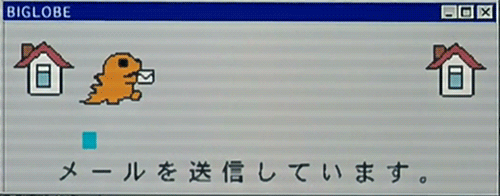There are many wonderful things to fill in your heart ♥
Don't wanna be here? Send us removal request.
Text

There is no silence without noise, there is no darkness without light. No consequence without action, there is no joy without you.
There is no madness without sanity, there is no hate without love. There is no death without life, there is no “ you and me ” without you.
There is no night without day, there is no tomorrow without today. There is no white without black, there is no essence without your love.
There is nothing without something, there is no us without me. There is no moon without the sun, there is no us without you.

No hay silencio sin ruido, no hay oscuridad sin luz. No hay consecuencia sin acción, no hay alegría si no estás tú.
No hay locura sin cordura, no hay odio sin amor. No hay muerte sin vida, no hay sin vos un “ tú y yo ”.
No hay noche sin día, no hay mañana sin hoy. No hay blanco sin negro, no hay esencia sin tu amor.
No hay nada sin algo, no hay nosotros sin mí. No hay luna sin sol, no hay nosotros sin ti.
—-siir-poesia—–
3K notes
·
View notes
Text
“Be alone. Eat alone, take yourself on dates, sleep alone. In the midst of this you will learn about yourself. You will grow, you will learn what inspires you. You will cultivate your own dreams, your own beliefs, your own stunning clarity. And when you do meet the right person who makes your cells dance, you will be sure of it because you are sure of yourself.”
— Bianca Sparacino
2K notes
·
View notes
Text
“Stop walking through the world looking for confirmation that you don’t belong. You will always find it because you’ve made that your mission. Stop scouring people’s faces for evidence that you’re not good enough. You will always find it because you’ve made that your goal. True belonging and self-worth are not goods; we don’t negotiate their value with the world. The truth about who we are lives in our hearts. Our call to courage is to protect our wild heart against constant evaluation, especially our own. No one belongs here more than you.”
— Brené Brown
3K notes
·
View notes
Text
I'm not all that smart. It takes me a while to understand things. But if I do have the time, I will come to understand you — better than anyone else in the world.
— Haruki Murakami, Norwegian Wood
4K notes
·
View notes
Photo

I am too old to worry about who likes me and who dislikes me..
55 notes
·
View notes
Link
This was some cool news to hear! Congrats, Rena! 👏🏻👏🏻
1 note
·
View note
Text
Moderately Interesting Japanese Episode 9: Animal Proverbs in Japanese
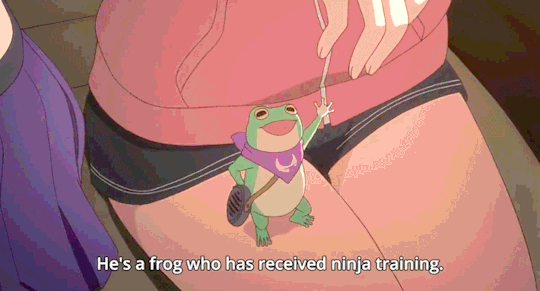
I have no idea what show this is from, but it’s so cute lol
I have a thing for Japanese. As you’ve likely noticed. And there are many aspects of the language that interest me, but one area in particular is 諺 kotowaza, or proverbs.
There are many intriguing proverbs, but today I’m going to focus on those that revolve around animals. How many did you already know?
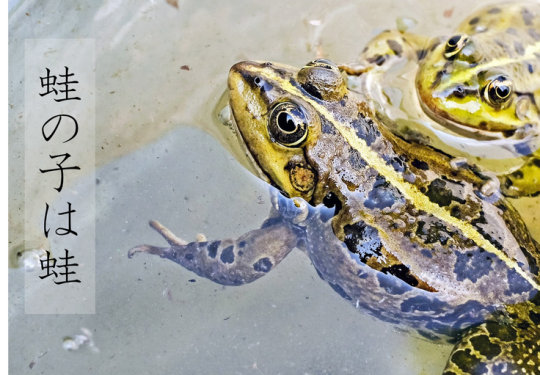
蛙の子は蛙 A frog’s child is a frog
Japanese pronunciation: Kaeru no ko wa kaeru English equivalent: Like father like son.*
I put an asterisk next to the English equivalent because it is not 100% equal. The English expression “like father like son” is often used in a positive light, expressing pride in the child for taking after the parent’s good qualities. It can also be used in a negative way, but I feel that the positive nuance is stronger.
However, the Japanese expression is only negative. When a frog is born it is not a frog but tadpole, which looks like an entirely different animal. Slowly but surely, though, the frogspawn changes until it is identical to its parents. This is a metaphor for children who seem able of surpassing their parents, but who ultimately wind up just like them.
For example, say that there are a mother and father who are not artistically inclined, and their young daughter draws a pretty good picture. They think that she will become a great drawer much better than they could ever be, but as time passes they realize that she is just as mediocre at drawing as they are. They may sigh and say, “Kaeru no ko wa kaeru.”
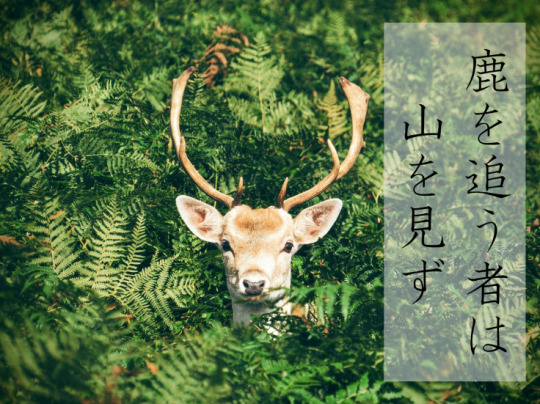
鹿を追う者は山を見ず He who chases the deer fails to see the forest
Japanese pronunciation: Shika wo ou mono wa yama wo mizu English Equivalent: You cannot see the wood for the trees.
Imagine a hunter who chases a swift deer through the mountain forest. He is so intent on his prey that he does not realize where he going, and by the time he has caught the deer, he is completely lost and darkness is falling. This expression is about people who are so fixated on one thing that they lose sight of other important things.
This expression is very similar to the English “You cannot see the wood for the trees,” which refers to someone who does not notice small but crucial details.

猫に小判 Gold before cats
Japanese pronunciation: Neko ni koban English equivalent: Pearls before swine
A “koban” is a large gold oval coin that was used for many centuries as currency in Japan. You could think of it as a hundred dollar bill in terms of worth compared to other Japanese coinage at the time.
Naturally, while a koban held a large amount of significance for any person, if you gave it to a cat the cat wouldn’t know what to do with it. It would probably give it a curious whiff and then walk away. This expression is used when someone’s gift or efforts are wasted on the recipient. It’s the exact same as the English “pearls before swine.”
Also, as a fun little side-note, anybody who’s in my generation or younger should know this, but can you name the first-generation cat Pokemon that was a Team Rocket henchman? Do you remember what he had on his forehead?
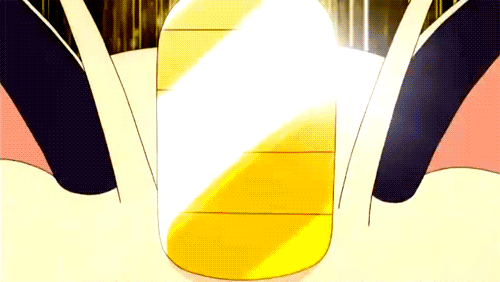
Who’s that Pokemon?! It’s Meowth! The golden coin on his forehead is shaped like a koban and is a reference to this proverb. There’s a fun fact you can share with your Pokemon-loving friends.
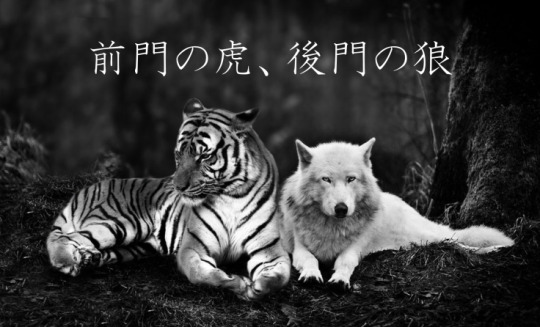
前門の虎、後門の狼 A tiger at the front gate, a wolf at the back gate
Japanese pronunciation: Zenmon no tora, koumon no ohkami English equivalent: Between the devil and the deep blue sea, or, between a rock and a hard place
Imagine that you have sneaked into the enemy’s fortress but were seen by the guards. You must escape through either the front or rear gates of the castle walls, but at the front gates waits a ferocious tiger and at the rear gates snarls a hungry wolf. Either will end poorly for you, yet you must choose one or the other. This expression refers to a situation in which neither of the available options are good.
When thinking of an equivalent English expression, the first one that came to mind was “between a rock and a hard place,” but it turns out that this expression is only about 100 years old. I wanted something with a bit more seniority, and that was when I stumbled across “between the devil and the deep blue sea,” which I had only known as a lyric in an Aerosmith song until then haha. It turns out this expression was first recorded in English almost 400 years ago though.
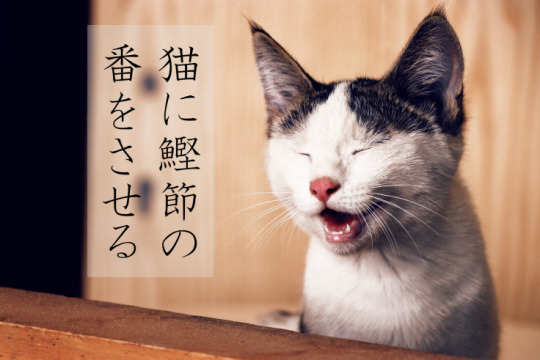
猫に鰹節の番をさせる Setting the cat to guard the dried fish
Japanese pronunciation: Neko ni katsuobushi no ban wo saseru English equivalent: Setting the fox to guard the henhouse
I really like this one. First, you need to know what “katsuobushi” is, which I loosely translated as “dried fish.” It’s actually tissue paper-thin shavings of dried bonito, and cats absolutely love the stuff. And why wouldn’t they? It’s got the strong taste and smell of fish that they crave without the hassle of having to pick out bones or tear through scales.
Therefore, you can imagine that a cat would not a trustworthy guard make. This expression is identical to the English “setting the fox to guard the henhouse.”

They smoke the bonito for a ridiculously long time until it looks like a fossilized banana, and then they shred it up with a fancy box. Voila, katsuobushi.
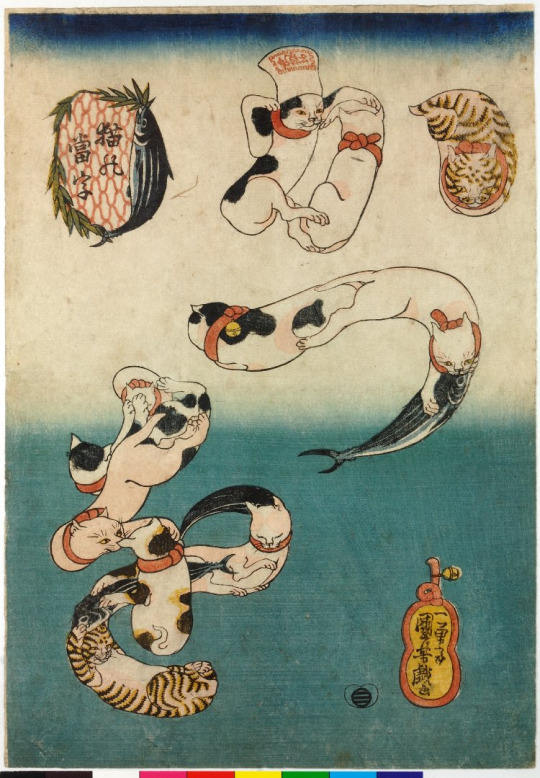
This is an official advertisement for katsuobushi from about 1843. The cats are spelling out かつを (katsuo).
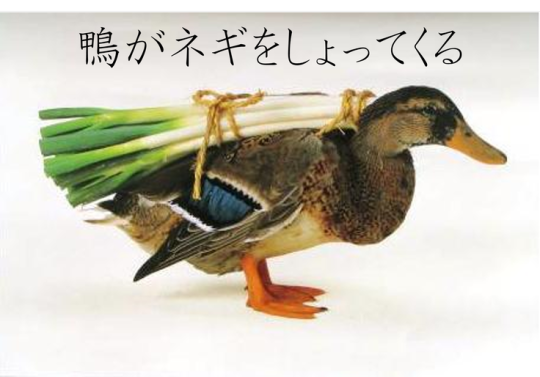
鴨がネギをしょってくる A duck comes bringing leeks
Japanese pronunciation: Kamo ga negi wo shottekuru English equivalent: ??
This one is a bit of head-scratcher lol. First, you need to know that there is a Japanese dish called “kamo nabe,” which is a duck stew with leeks. If a duck comes to you on its own, that in and of itself is a good thing for you. If it is also carrying leeks, it is even better. In other words, this expression is used when two or more convenient/beneficial things happen at the same time.
However, there is another underlying message of this expression that makes it difficult to find a matching English expression. That is, that the duck who unknowingly seals his fate is naive/foolish. Also, a duck is seen as an easy-to-trick or simple-minded bird. (Think of the English expressions “sitting duck” and “lame duck.”)
Specifically, this expression is used when Person A unknowingly does something beneficial for Person B that will later come back to hurt Person A.
I hunted for an equivalent expression in English but couldn’t find one. If you know of one in English or another language, please let me know in the comments!
Also, there is another Pokemon based on this expression. Do you know which one it is?
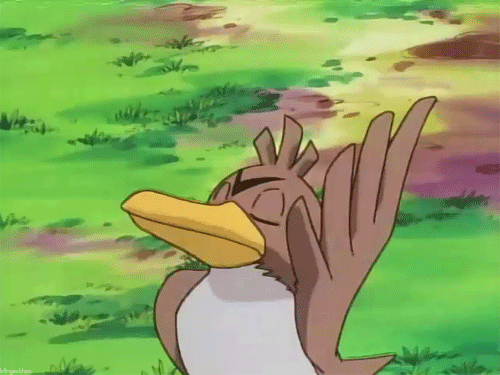
Yep, it’s Farfetch’d! Its name in Japanese is カモネギ (Kamonegi), or Leek Duck. Two Pokemon facts in one post? How much better can it get?

取らぬ狸の皮算用 Counting the pelts of raccoon dogs one has yet to catch
Japanese pronunciation: Toranu tanuki no kawazanyou English equivalent: Counting your chickens before they’ve hatched
The Japanese version of this well-known expression is decidedly darker than the English one. Imagine a hunter laying a dozen traps for raccoon dogs (called “tanuki” in Japanese) and bragging to his friends how he was going to catch 12 in a day. Upon checking the traps, he sees that he has only caught five. His friends would say, “Don’t count your pelts before you’ve caught them.”

立つ鳥跡を濁さず A bird taking flight does not foul the water
Japanese pronunciation: Tatsu tori wa ato wo nigosazu English equivalent: Burn no bridges
This expression can be heard on an almost daily basis in Japan. When a bird takes off from the water, it leaves behind clear, clean water only. There is no trace that it was ever there once the ripples have faded.
This is most commonly used when someone quits their job. It is important to leave no unfinished business or messes for your coworkers to clean up after you, and of course you want to leave on a good note with everyone. When you depart, you should make sure that you leave no unfavorable traces of yourself behind.
I guess that the closest English expression would be “burn no bridges,” though I saw several people stating “It’s an ill bird that fouls its own nest” as an equivalent. I feel like that expression is different, though, because it focuses more on the the perpetrator and less on the people around him, while the Japanese expression is all about making sure not to inconvenience others.
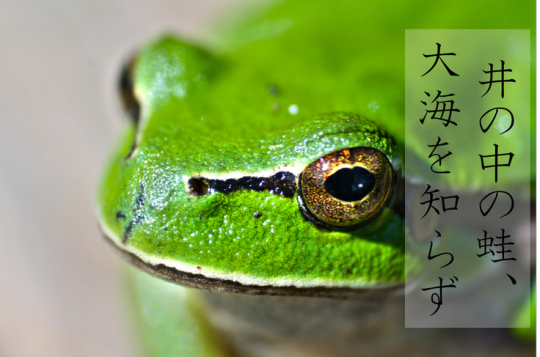
井の中の蛙、大海を知らず A frog at the bottom of a well knows nothing of the great ocean
Japanese pronunciation: I no naka no kawazu, taikai wo shirazu English equivalent: He that stays in the valley shall never get over the hill.
We all know at least one person who is woefully narrow-minded, not for lack of effort but simply because their world extends only to their city limit. They do not travel, do not have friends from varied backgrounds, and do not actively seek out the unfamiliar. This leaves them unaware of all the world has to offer.
The Japanese expression summarizes this predicament beautifully. A frog living in the bottom of a well may think that he is in the great expanses of the sea, but in actuality is in a prison, starved from all the wonders of light and sensation that are waiting outside the well.
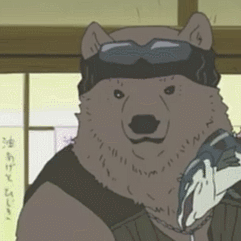
The End!!
I hope you guys enjoyed today’s Moderately Interesting Japanese. Work has been…absolute chaos. My old boss was moved to a new project within the company. They’re shorthanded and I’ve been asked to translate over 30,000 pages of high level tech training materials (that I have no experience/knowledge of) into Japanese…in 5 weeks…on top of my regular duties… Needless to say I am exceedingly close either to drinking enough caffeine that my third eye opens, my chakras align, and I become an omnipotent god, or a mental breakdown. But I only have 2,000 more pages to go until I’m finished!
My queue of word of the day posts is running low and it might be a few days until I can get some more ready, but please be patient. I still have tons of cool words I want to share with you! ♡
4K notes
·
View notes
Text
✨How to Study Languages When You’re BUSY✨
school is just around the corner, and i know that once school starts, i’ll have less and less time to study languages. as students, we can’t avoid crazy schedules, especially with all the lectures, labs, and extracurricular activities interrupting our perfect duolingo streaks! but there are ways you can still keep up with learning a language, even when you’re busy! here are some tips to keep up with a new language.
squeeze language practice into your every day schedule - even just 5 minutes a day! you don’t need to spend an hour everyday on learning languages. you can practice for as little 5 minutes a day, as long as you do it everyday. 5 minutes before you go to bed, on your transit to school or work, when you’re eating lunch, before classes start - you can always find at least 5 minutes to work on duolingo practices or refresh memrise vocab lists. for duolingo and memrise, make sure to set a daily goal - this will motivate you to maintain those streaks, encouraging you to practice everyday!
don’t overestimate how much you’ll be able to accomplish each day. i used to set my duolingo daily goal super high, and when i don’t meet the goal for that day or miss a streak, it’s easy to feel discouraged. AVOID OVER-REACHING. set practical, realistic goals for yourself. you can always overachieve those smaller goals and feel better about yourself. don’t be afraid to take it slow!
treat language studying as a class and block a schedule for yourself in your routine. if you’re super motivated into learning languages, treat it more as class than as a hobby. this means you have to get organized. like you would for a class, set a designated time block to study the language. for example, twice a week tuesday and thursday, 30 minutes each after lunch. in those designed time blocks, you can focus on sharpening those language skills by learning more in-depth grammar points, reading a short piece, listening to dialogues, or watching a short video in your target language. doing this will make sure you’re not just scratching the surface - you will actually progress.
engage in passive learning. this is perfect for when you’re busy. listen to music in your target language, listen to podcasts when you’re exercising, watch movies or tv shows (even with subtitles is ok!), switch your phone and other devices into your target language.
do something fun with your target language to spark continuous interest. once in a while, come up with fun and interesting projects you can do with your target language! for example, if there’s a song you love, translate the lyrics! watched a good movie recently? look at the screenplay and analyze your favorite dialogues, and make sure to break down new vocabs and grammar. transform your favorite quotes into an artwork and hang it in your room! get creative and do something you’ll enjoy.
record your progress and your accomplishments! this is super helpful for organizing your studying progress, seeing how far you’ve gone, and celebrating your accomplishments.
set long term goals to keep motivated. you can scratch the surface with that 5 minutes per day routine, but to truly get anywhere with a new language, make sure you’re setting long term goals! that is, by the end of the year, what will you want to be able to do? do you want to read harry potter entirely in your target language? be able to hold a conversation with a native speaker? watch movies without subtitles? travel to the country? these are the type of questions you should ask yourself.
good luck everyone! and have a wonderful semester!
6K notes
·
View notes
Photo










2020-04-05
Canon EOS R + RF85mm f1.2L
https://www.instagram.com/hwantastic79vivid/
2K notes
·
View notes
Text

"Mỗi vật đều có 1 tính, nước thì nhạt, muối thì mặn. Nước thêm nước vẫn là nước, muối thêm muối vẫn là muối. Chua ngọt cay nhạt mặn, năm vị điều hoà, cùng tồn tại hoà trộn tạo ra trăm ngàn vị khác. Vật đã thế, sự việc cũng thế, con người càng thế."
Tựa đề:
"Củ cải nấu lên vẫn là củ cải, củ cải nướng thịt thì đã khác".
Tom là một cậu bé chăn cừu, cậu có một đàn cừu thuần màu trắng như một đám mây cực lớn. Chính vì thế Tom cực kì ghét con cừu đen duy nhất trong đàn, cậu luôn hăm he làm thịt nó.
Vào một ngày mùa đông nọ, trời đổ tuyết lớn, đàn cừu màu trắng lẫn trong nền tuyết làm Tom không cách nào tìm được. Cuối cùng nhờ con cừu đen duy nhất đó mà Tom tìm về được đàn cừu của mình.
Từ đây Tom hiểu được một đạo lý, thuần tuý cố nhiên rất đẹp, thế nhưng cộng sinh hài hoà lại càng tốt hơn.
Trên thực tế, mỗi vật đều có tính chất khác nhau, có vẻ đẹp khác nhau. Hổ dễ nổi nóng, khỉ hấp tấp, cừu hiền lành, động vật đã vậy, thực vật lại càng thú vị hơn, trên đời này không bao giờ có hai chiếc lá giống hệt nhau, cả những thứ cùng loại cũng không phải nhất thành bất biến huống chi là những vật khác nhau hoàn toàn.
Vật đã thế, người còn khác nhau hơn.
Tả Truyền từng viết, tư tưởng con người không ai giống ai, mỗi người một vẻ. Mà tư tưởng thế nào hoàn toàn phụ thuộc vào tính cách của người đó. Nếu muốn tôn trọng cái gọi là tư tưởng đó thì cần học cách khoan dung, đừng bao giờ vọng tưởng thống nhất tư tưởng, nó là điều phi lý.
Nhưng vấn đề là đã không cách nào thống nhất tư tưởng, vậy phải chung sống thế nào?
Có hai cách, một là tập hợp những người cùng chung chí hướng, những người cùng chung sở thích tập hợp với nhau, hình thành nên một quần thể có quan niệm chung.
Nhưng tiếc là chuyện này rất hiếm có, như củ cải nấu lên vẫn là củ cải, củ cải nướng thịt thì đã khác, làm sao có tư tưởng nào giống tư tưởng nào hoàn toàn.
Sự tham gia của nhiều tư tưởng giống mà khác nhau này còn phá vỡ sự cân bằng sản sinh ra biến hoá. Cát rơi vào miệng trai, thành trân châu quý giá, bụi trong hơi nước hoà thành mưa. Chính vì thế có một câu nói rất đúng rằng: “Người với người khác nhau, chưa chắc là chuyện xấu, chim diều không cần phải biến thành quạ mới có thể chung sống hoà bình.”
Nói cách khác là mỗi người một vẻ, tức là hoà hợp.
Từ bản thể triết học mà nói, hoà hợp là quy luật vận hành của vạn vật. Lão Tử nói: “Vạn vật đều có âm có dương, cân bằng âm dương chính là hoà hợp.”
Từ góc độ triết học mà nói, hoà hợp là cảnh giới cuối cùng mà con người theo đuổi. Lễ ký viết: “Những kẻ biết hoà hợp mới là kẻ làm chủ và đạt được cái đạo của thiên hạ”. Hoà hợp tạo ra sự xây dựng, sản sinh, thuận tiện, thành công và thịnh vượng.
Từ góc độ phương pháp luận triết học thì hoà hợp là quy tắc làm người cơ bản. Luận ngữ viết: “Quân tử hoà hợp nhưng cũng khác nhau.” Chỉ khi thuận theo quy tắc hoà hợp để diễn sinh phát triển thì mới có thể tồn tại lâu dài.
Từ góc độ sinh học thì cộng sinh là một trong những mối quan hệ quan trọng nhất trong hệ sinh thái. Hai loại sinh vật cùng giúp nhau tồn tại, thiếu một bên, bên còn lại cũng khó sống nổi. Như tảo và nấm cộng sinh, cá sấu cộng sinh với chim bắt sâu, bò tót cộng sinh với chim ăn ruồi bọ.
Hoà hợp mà khác biệt, cái quan trọng nhất là phải chấp nhận và dung nhập vạn vật, thứ hai là biết chọn lựa và sử dụng những thứ phù hợp với đặc tính tự thân để hoàn thiện chính mình. Cuối cùng là đặt mình trong nhiều hoàn cảnh, tập cho bản thân tính phóng khoáng lạc quan.
Dù là một chỉnh thể bền chắc như thép cũng phải có một thứ khác biệt để điều hoà. Không ít những công ty quốc tế luôn giữ vài người có ý kiến trái ngược nhau trong hội đồng quản trị, những người này sẽ luôn soi mói làm khó dễ các quyết định được hội đồng đưa ra, thế nhưng chỉ có vậy mới có thể thúc đẩy hội đồng đưa ra những quyết sách chính xác và đúng đắn nhất.
Từ Tiểu Bình từng nói: “Với những người gây dựng sự nghiệp từ hai bàn tay trắng, trong nhóm có 3-4 người trung thành và 1 người luôn làm trái lại, chính là tổ hợp tuyệt vời nhất.”
Đạo lý này rất đơn giản, kẻ làm trái lại ấy đóng vai người điều hoà, anh ta phản bác, đánh thức, thúc tiến người lãnh đạo, như chim gõ kiến trên cây, vừa là bác sĩ vừa là kẻ gây tai hoạ. Nhưng nó sẽ luôn luôn tồn tại song hành với bạn.
Vậy vấn đề mới lại sinh ra, dung hợp có làm mất đi bản chất của mình không? Hoà hợp, chỉ là điều hoà, không phải hoà tan rồi làm mất bản thân. Bạn có thể đứng ở Trung Quốc nhìn ra thế giới, cũng có thể đứng ngoài thế giới nhìn vào Trung Quốc, nhưng đầu tiên bạn phải là người Trung Quốc là dân tộc Trung Hoa, sau mới là thế giới.
Muối bỏ vào nước sinh thành nước muối. Nước muối bỏ thêm vịt cũng chỉ là nước muối vịt. Mặc cho bạn dung hoà vào quần thể thế nào, bạn cũng phải biết mình luôn là muối, mỗi thứ mỗi vẻ, trăm vẻ dung hoà!
• Cre: Zhihu
90 notes
·
View notes
Photo
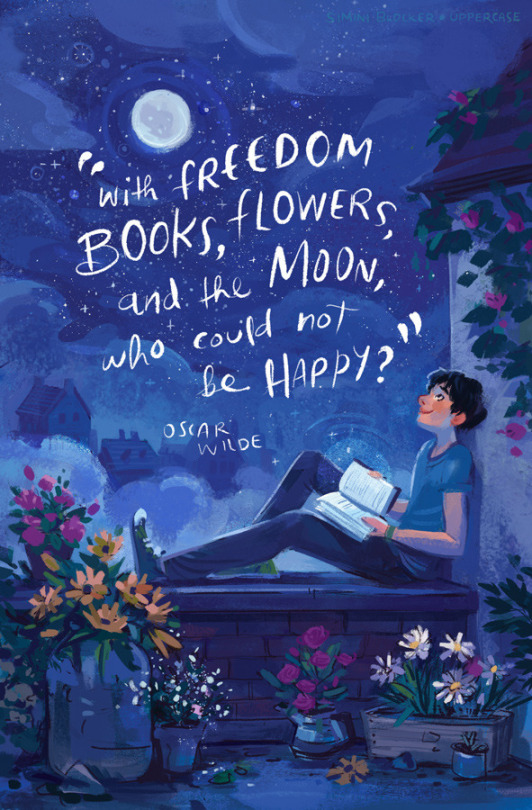
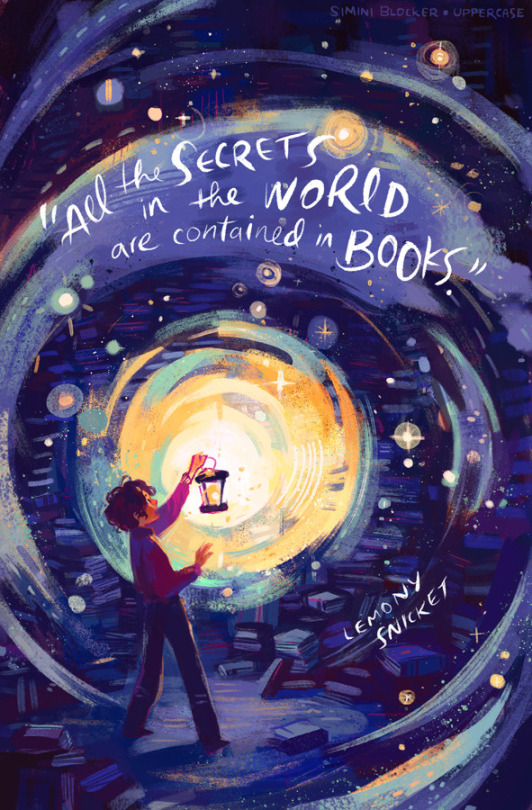






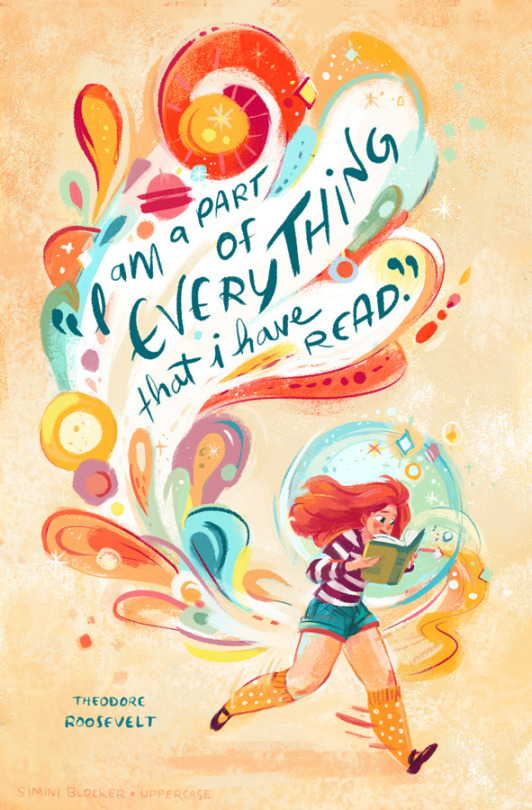

Enchanting Bookworm Inspired Digital Illustrations by Simini Blocker
NYC based illustrator Simini Blocker understands the enchanting world bookworms revel in. From Hogwarts to Neverland or King’s Landing, Blocker captures the spellbinding imaginative realms literature has introduced to us with vibrant colours, gorgeous brushstrokes and fitting quotes from our favourite authors. You can find her gorgeous illustrations on Society6 and Etsy.
View similar posts here!
Keep reading
107K notes
·
View notes
Photo

Tôi gieo hạt giống cúc dại trong hai cậu cây nhỏ và một chậu hàng rào, mỗi sáng thức dậy tôi đều tưới nước cho chúng. Một tuần sau, mái đầu màu xanh non mềm mại của chúng bắt đầu nhảy ra khỏi hạt, mỗi buổi sáng tôi đều nhìn chúng mỉm cười. Tôi cũng hy vọng chúng sẽ mỉm cười.
Tôi gieo một ước mơ lớn lao… nhưng không phải cho chính mình, từ năm mười tuổi. Tôi không biết phải thực hiện chúng như thế nào. Tôi là một đứa trẻ không nhìn thấy lối đi nào cho chính mình. Mỗi ngày thức dậy đều thấy thời gian trôi đi chầm chậm, năm tháng đó như gắn vào chân những mắc xích vô hình, cho đến một ngày đủ mệt mỏi để tôi nghĩ mình không còn muốn đi thêm bước nào nữa.
Gần mười năm sau, tôi lại nuôi một ước mơ nhỏ nhoi… ước mơ cho chính mình. Tôi mỉm cười với nó, dang tay đón nhận như thể tất cả là vừa vặn chỉ đợi mình bước đến. Thời gian trôi đi chầm chậm, nhưng tất cả mọi thứ vuột qua bàn tay như tôi chưa kịp một lần chạm vào chúng. Cho đến một ngày đủ bình thản để nhận ra rằng chưa một câu chuyện, chưa một con người nào… thật sự thuộc về mình.
Chưa… một ai cả.
Tôi ngước mắt nhìn trời, nhìn những mảnh vụn trong ước mơ nhỏ nhoi đó rơi xuống chân mình. Khi tất cả đã đủ xé toang những đám mây hồng, bên dưới bầu trời đầy vết rạn đã xuất hiện mái đầu xanh non mềm mại của hạt mầm được gieo năm mười tuổi. Lối đi.
Tôi lại mỉm cười với chúng. Nụ cười của hai mươi năm sau, đủ chua xót, đủ đắng cay, đủ để biết mình không còn muốn cảm thêm thứ dư vị nào nữa. Và đủ bình yên để chối từ những ngọt ngào hư ảo. Ước mơ nhỏ nhoi năm nào cũng đã chấp nhận yểu mình ngủ yên trong lòng đất.
.
.
.
Hãy nuôi cho mình ít nhất một ước mơ trong đời. Con người có thể bỏ người, mây hồng có thể bỏ ánh nhìn tan vỡ, nhưng ước mơ sẽ không rời đi nếu con người không chọn từ bỏ chúng. Ước mơ không nhất thiết phải cho chính mình, nụ cười không nhất thiết phải phát ra từ câu chuyện của bản thân mới làm mình hạnh phúc. Hạnh phúc được ban tặng và người đi ban tặng hạnh phúc, nếu không được làm người “nhận” thì hãy làm người “cho đi”.
Trước khi muốn từ bỏ kiếp con người, hãy biết đến cuộc đời đau thương của loài chim Yến.
| IEphong |
266 notes
·
View notes
Text

Chúng ta đều là trạm dừng chân tạm bợ của một vài ai đó, và là chốn về yên ổn của một ai đó.
.
Nhưng làm sao biết được ai là người chỉ tạm bợ ghé ngang, ai mới là người chịu neo lòng ở lại?
.
Đời người tốt nhất là đừng nên gặp quá nhiều người, để rối bời chẳng biết đâu là duyên, đâu là nghiệp, đâu mới là chân tình, còn đâu chỉ toàn giả ý.
.
Bởi khi còn trẻ, người ta dễ đau lòng vì những lần rời tay buông bỏ... của những người cứ ngỡ là người thương. Rốt cuộc cũng chỉ là khách qua đường, dừng chân trú tạm, nhân ngày bão giông. Rồi nắng hửng mưa tan, họ rời đi. Và chúng ta ngơ ngác tự hỏi, rốt cuộc mình đã làm sai điều gì, mà chẳng thể giữ lại nổi một con người?
.
Nhưng chúng ta thật quá ngốc rồi, chúng ta ơi. Vì ngay từ đầu, làm gì có đúng sai. Khi “trạm dừng” vốn dĩ chỉ là nhất thời, còn cái mãn đời lại thuộc về “chốn về” nương náu sau cùng.
.
Thế nên đừng cam tâm làm một trạm dừng chân, đừng phó mặc cho lòng mình quá nhiều người ghé ngang tạm bợ. Trạm dừng này, khoá kín cửa then cài, treo bảng cấm từ đây. Chỉ mở ra cho đúng người xứng đáng muốn an ổn ở lại, muốn chung tình lâu dài.
.
Miễn tiếp khách qua đường. Chỉ đón đợi người thương.
.
Bởi vậy tốt nhất, đ���i người đừng nên gặp quá nhiều người. Gặp đúng người, là đủ!
.
Cre: Anh Khang
596 notes
·
View notes
Text
Triết lý viên kẹo
Dù bạn có làm bao nhiêu điều tốt, cống hiến đến đâu thì chăng nữa thì người ta luôn chỉ nhìn vào những thứ bạn không đạt được mà đánh giá.
Hàng xóm của bạn có một đứa bé kháu khỉnh đáng yêu, bạn thấy quý nó vô cùng. Mỗi ngày bạn đều cho một đứa trẻ ăn kẹo. Bạn làm điều đó rất tự nguyện, thường xuyên và vui vẻ. Đứa trẻ ấy cũng có vẻ yêu bạn. Mỗi ngày thấy bạn, nó đều cười tươi và chạy đến nhận kẹo.
Rồi một ngày kia, bạn gặp chút mệt mỏi và quên bẵng mất mình đã hết kẹo mà chưa đi mua. Gặp đứa bé trên đường đi làm về, bạn xoa đầu nó và bảo: “Chú hết kẹo rồi”. Bỗng dưng bạn thấy thái độ của nó lập tức thay đổi. Nó thờ ơ, lạnh lùng gào ầm lên rằng bạn keo kiệt, bạn xấu xa. Hoặc nó đi khắp nơi nói nói với mọi người rằng bạn không còn tốt với nó nữa.
Triết lý viên kẹo có nghĩa là khi bạn cho ai khác một thứ gì, nhiều khi họ sẽ không nghĩ ấy là món quà, họ nghĩ đó là bổn phận, là trách nhiệm. Khi bạn không cho thứ mà họ muốn nữa, họ sẽ lập tức trở mặt với bạn. Nếu ở trong hoàn cảnh đó liệu bạn có thể tiếp tục “cho đi” nữa hay không? Với nhiều người, cho dù bạn có cho họ kẹo mỗi ngày, thì họ cũng chỉ nhớ mỗi một ngày mà bạn đã không cho mà thôi.
Bạn là một người chân thành và cởi mở, luôn nhiệt tình đối với bạn bè. Những gì bạn mình cần giúp đỡ, nếu trong khả năng thì bạn chẳng hề chối từ. Bạn bè của bạn dần dần quen với việc họ cần người an ủi bạn sẽ đến, họ thiếu tiền, bạn sẽ giúp,… Bạn như thể luôn là một người lớn, người hùng trong mắt bạn bè, mỗi khi họ cần thì bạn sẽ có trách nhiệm đến an ủi động viên. Đến một hôm, họ trách bạn rằng không còn đối xử tốt với người ta nữa. Nhưng họ lại không chịu nhớ rằng ngày cô ấy cãi nhau với sếp thì bạn lại vừa mất một cơ hội thăng tiến.
Bạn là một nhân viên mẫn cán nhất phòng, không ngại ôm nhiều việc, chẳng ngại làm thêm giờ. Bạn luôn tâm niệm rằng chỉ cần công việc tốt lên là được, tính toán thiệt hơn gì việc ai làm ít ai làm nhiều làm gì. Bạn không phải là người nhanh nhẹn nhất nhưng sẽ luôn là người cần mẫn nhất. Bạn không phải là người giỏi nhất nhưng sẽ là người chăm chỉ nhất.
Bất chợt đến một ngày, bạn cảm thấy mình đuối sức. Bạn cảm thấy mình cần về nhà sớm và bạn cảm thấy mình cần có người chia sẻ công việc. Sếp dường như trở thành một người khác, đánh giá thấp kỹ năng của bạn, cho rằng những cố gắng của bạn bằng 0 và phóng đại cả những khuyết điểm của bạn lên nữa chứ.
Bạn làm việc hết mình chẳng tính toán thiệt hơn. Nhưng sếp bạn có thể lại cho rằng đó là bổn phận, trách nhiệm của bạn. Trực ngoài giờ, là trách nhiệm của bạn. Không để khách hàng nào khiếu nại, là trách nhiệm của bạn. Hoàn thành công việc sớm, là bổn phận bạn cần làm.
Đồng nghiệp thì lại cho rằng bạn đang lười biếng, đang buông bỏ. Bạn đang đùn đẩy trách nhiệm cho họ, khiến tự nhiên họ phải làm những việc trước đây chẳng phải động tay. Dù bạn có làm 200% sức lực thì đến hiện tại điều đó đã trở thành nghĩa vụ- mà bạn phải thế. Cho nên, khi bạn chỉ làm đủ 100% những việc cần, mọi người cho rằng bạn chưa hoàn thành đủ trách nhiệm của mình.
Bài học này thật sự quan trọng trong cuộc sống chúng ta. Những điều chân thành từ tấm lòng của bạn không phải ai cũng xứng đáng để nhận. Hãy biết chọn lựa để bản thân không phải hối tiếc những gì bạn đã “cho đi”. Có thể bạn cần cân nhắc lại về việc “cho đi” đối với những người thật sự xứng đáng hơn.
st

122 notes
·
View notes
